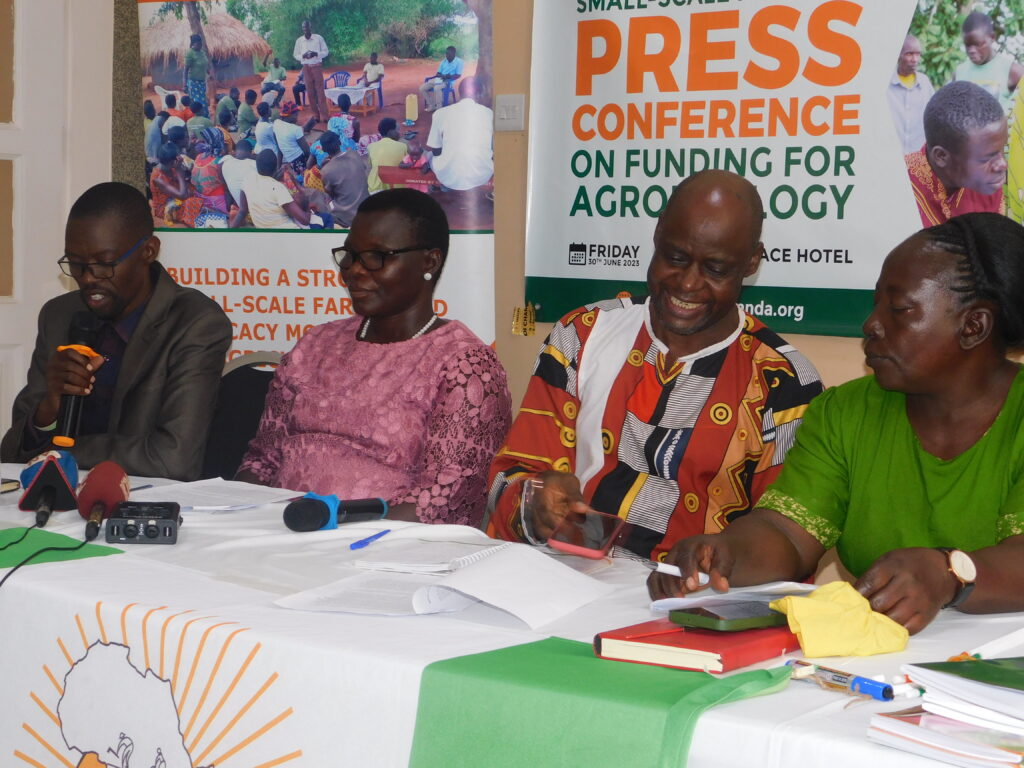By Joshua Kato
Although the general funding to agriculture was increased from sh1.4trillion to sh2.2trillion, small holder farmers were left out-according to the East and Southern Africa Small Scale Farmers Forum (ESAFF).
The budget was read under the theme “Full Monetization of Uganda’s Economy through Commercial Agriculture, Industrialization, Expanding and Broadening Services, Digital Transformation and Market Access”.
Commercializing agriculture is to enhance production and productivity and improve the competitiveness of agricultural products in the achievement of the theme for FY 2023/24. The government allocated sh2.2 trillion for food security, irrigation, climate change mitigation, value chain development, agricultural research and disease control, among others. This allocation is 4.2% of the national budget making it far less than the 10% funding commitment in the Malabo Declaration.
According to the budget, the priority actions to commercialize agriculture in the 2023/24 financial year include the following; Support agricultural research for the development of climate resilient crops and animal species; Promote environmental conservation, restoration and protection of degraded water catchment areas and forest cover; Construct small, medium and large-scale irrigation schemes in water stressed areas.
These will include the construction of earth dams at Unyama in Gulu, Namalu in Nakapiripirit, Sipi in Bulambuli, Kabuyanda in Isingiro, among others; Implement large-scale mechanization and irrigation; and; Improve farmer mobilization, education and partnerships with large commercial farmers for the production of strategic commodities, such as coffee maize and tea to meet national and international demand.
Uganda’s food security and rural development depend on its large number of small-scale farmers. The 2023/2024 national budget shows relative support for citizens, notably small-scale farmers recovering from COVID-19. This budget supports the transition from a raw materials-based economy to a manufacturing and knowledge-based one, but allocation to human development is constrained.

Agroecology investment is needed to promote value addition, business growth, and employment creation for youth, women, and all Ugandans. To achieve it is aspirations in this national budget, there is need to extensively address persistent corruption, late fund disbursement, and limited balanced-community partnership.
“Key areas that have either been ignored or underfunded in the budget include agricultural extension, the government should increase the funding for extension to meet the demands for the extension to cater for transport facilitation, recruitment, training, and equipping of extension workers for improved extension service delivery,” observes Hakim Baliraine, ESAFFI Uganda National Chairperson.
The small scale farmers further ask the government to build the capacity of extension workers along with farmers’ initiatives like the Farmer Field Schools that support small-scale farmers’ extension; allocate more funds for the establishment of valley dams to promote irrigation since drip irrigation is limited to crops like tomatoes and other vegetables; allocate funds for the boosting of agricultural credit facilities for small-scale farmers’ production and productivity; allocate funds to mitigating the effects of climate change for example building on the tree planting across the county and the restoration of the encroached wetlands and other natural resources.
“Invest more funds to post-harvest handling and storage facilities and allocate more funding to seed management by supporting the Farmer Managed Seed System and Community Seeds Banks,” says Christine Nabwami, a farmer from Mityana. She explains that where as government gives seeds, these are commercial seeds that may not be re-planted. “However, small scale farmers generated seeds can be replanted, hence farmers do not depend on commercial dealers,” she says.





